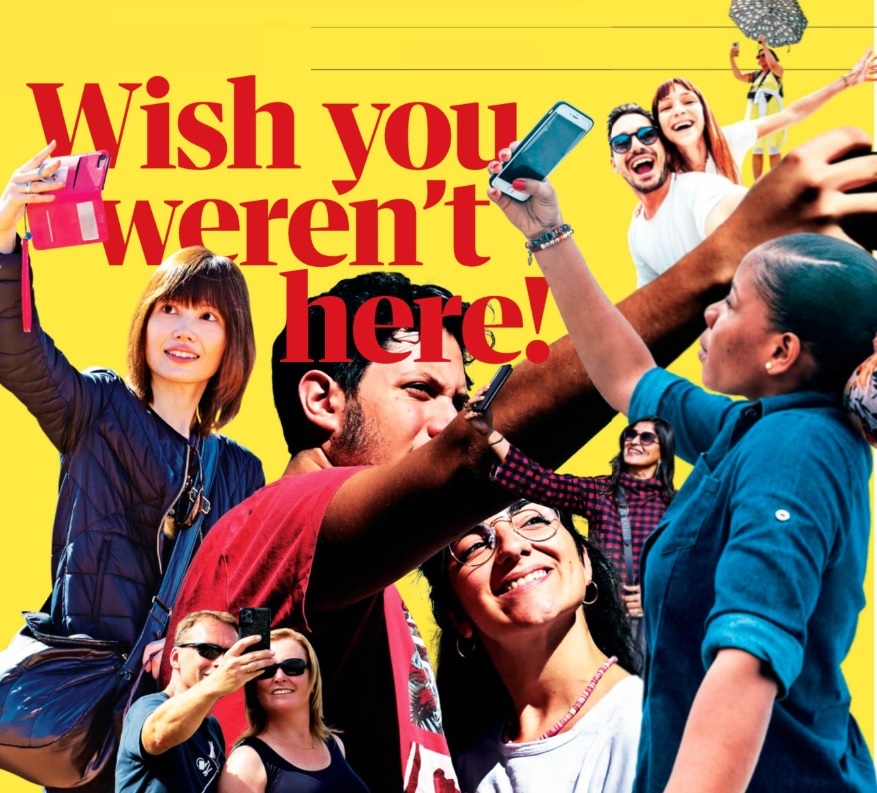
Last month, protesters took to the streets of Palma, Mallorca, carrying placards daubed with slogans like "No to mass tourism" and "Tourism, but not like this".
Although he did not attend, Mallorcan Jaume Fuster, 27, agreed with the protesters' message. "They should be a wakeup call to our politicians to legislate against the overcrowding and bring in laws that improve the quality of life of us residents," the hotel worker said.
The island's housing crisis is out of control, said Fuster, who, like many of his friends, lives with his parents.
"It is impossible to live independently on our salaries," said Fuster, who is employed only for eight months of the year. He recognises the benefits of attracting visitors to the island where he has grown up. "But every year we have record numbers of people coming. The demand doesn't stop."
Such issues are not just confined to Spain. Surging visitor numbers, soaring housing prices and the rise of selfie-seeking tourists have helped to create situations that are "totally out of balance", a Unesco official has said, adding that a failure to address these issues could see protests like those seen in Spain extend across Europe.
From Málaga to Mallorca and Gran Canaria to Granada, tens of thousands of protesters have taken to the streets in recent weeks. Organisers have stressed that the protests are not against tourism, but rather a call for a more balanced approach.
This story is from the August 16, 2024 edition of The Guardian Weekly.
Start your 7-day Magzter GOLD free trial to access thousands of curated premium stories, and 9,000+ magazines and newspapers.
Already a subscriber ? Sign In
This story is from the August 16, 2024 edition of The Guardian Weekly.
Start your 7-day Magzter GOLD free trial to access thousands of curated premium stories, and 9,000+ magazines and newspapers.
Already a subscriber? Sign In

THE SAVAGE SUBURBIA OF HELEN GARNER
Over 50 years the Australian has become one of her country's most revered and beloved authors, writing as if readers were her friend, party to her most candid thoughts. Is she finally going to get worldwide recognition? By Sophie Elmhirst

Israel's block on aid raises health fears for underfed population
Briefing the Israeli press after Benjamin Netanyahu’s order last Sunday to turn off the aid supply to Gaza - in an effort to pressure Hamas into accepting a change in the ceasefire agreement to allow for the release of hostages without an Israeli troop withdrawal - government officials claimed the Palestinian territory had several months’ worth of food stockpiled from earlier deliveries.

Dam it! How eager beavers became the farmer's friend
A Cornish farmer is behind a change in the law to release wild beavers in England after witnessing the incredible benefits on his land

Call of duty
This rural English village phone box was used fewer than 10 times in the whole of 2024-but Derek Harris sees it as a lifeline and is determined to save it.

Santa Fe mourns the mysterious loss of Gene Hackman
As New Mexico authorities investigate the deaths of Gene Hackman and his wife, Betsy Arakawa, their adopted home town of Santa Fe is grappling with the mystery of what happened to the couple.

Ramadan should be a time for reflection, not date-scented shopping
Supermarkets have wheeled out the 20kg bags of rice. High-street stores have popped hijabs on mannequins. Cosmetic companies are churning out products scented with pomegranate, cardamom, saffron and “sticky date” - at Lush you can buy Salam shower gel, Noor lip butter and a massage bar that apparently smells like a turmeric latte. All this can only mean one thing in our modern, consumerist world: Ramadan is upon us.

Days of Gracie
After dodging toxic fans, 'nepo baby' jibes and her own projectile vomit, pop star Gracie Abrams explains why she's writing about our uncertain future
I'm upset by my troubled mother-in-law's extreme views
I've had a terrible run in with my mother-in-law and don't know what to do about it.

Only connect - The NigerianAmerican author returns with an ambitious, astute and moving exploration of female experience
Novels had always felt to me truer than what was real,\" declares a character in Dream Count, the highly anticipated new novel by Chimamanda Ngozi Adichie.

Labour's aid cuts are wrong morally - and economically, too
Get right down to it and there are two reasons for thinking that cuts to Britain's aid budget to pay for defence are a seriously bad idea.
